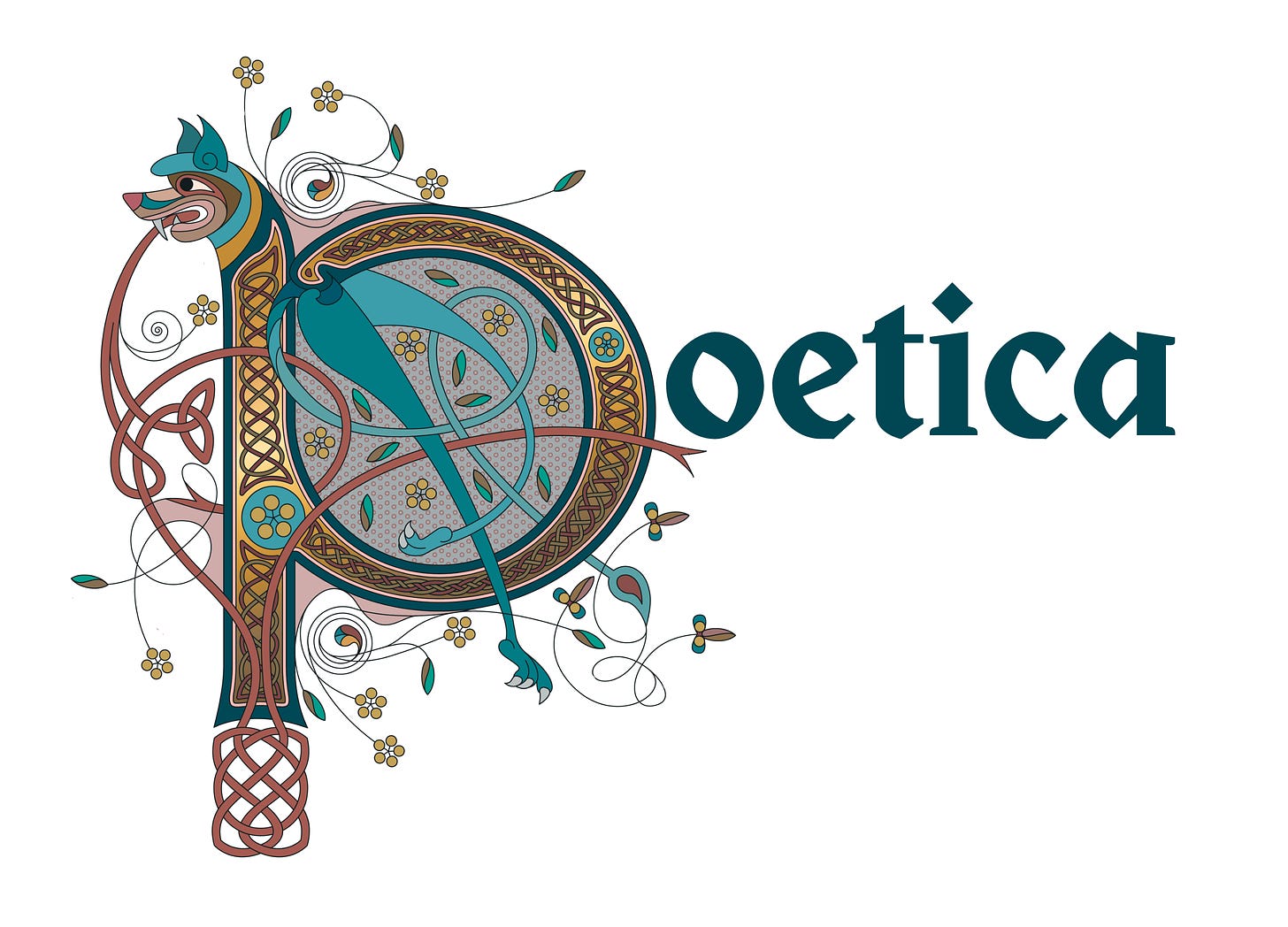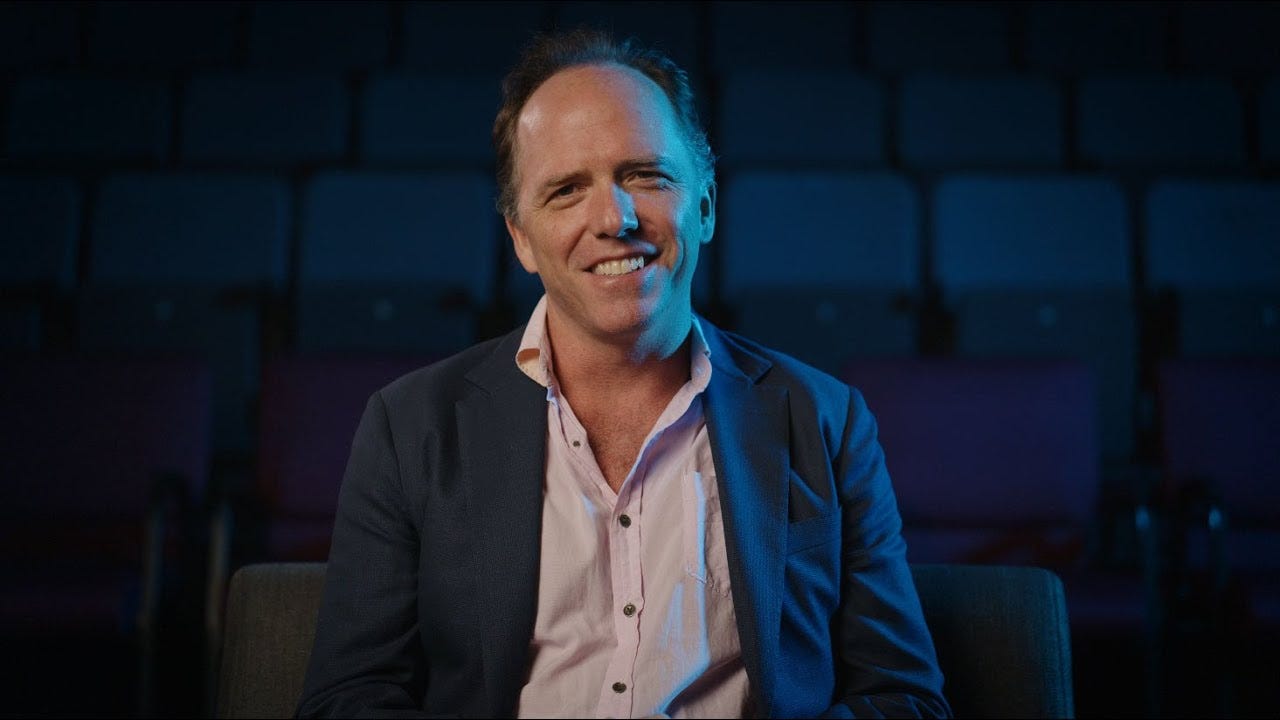Welcome to Poetica, the monthly poetry column of Shadowlands Dispatch! This month, Shadowlands Dispatch is pleased to present a poem by Bradford Winters, “FARTHER, FATHER, FEATHER.” Winters is a writer, producer, and showrunner in television whose drama credits include Oz, The Americans, The Sinner, and Clickbait. He is also the author of the comic book and screen project Americatown, about an overseas enclave of American immigrants in the near future. A former blogger for Image journal, Winters has had poems published in a variety of journals including (but not limited to) Spoon River Poetry Review, Georgetown Review, Christian Science Monitor, and Sewanee Theological Review. He lives in Boston with his wife and three children.
Shadowlands Dispatch: Tell us a bit about your background as a writer—your journey to this vocation, past projects you’re particularly proud of, and why poetry is an important part of your literary life.
Bradford Winters:
As an undergraduate, I arrived at Stanford not knowing what I would major in, with no designs on a future in writing. I’d written my first poem the prior year in my application to Harvard—an ill-advised attempt to make my application stand out—but their rejection didn’t deter me from majoring in English at Stanford with a focus in poetry. After college, I fell into screenwriting quite unexpectedly, and at first quite unwillingly, as the highbrow poet in me had a low opinion of a career in television at the time. This was a few years before the dawn of “peak TV” that began with HBO’s first drama series “Oz,” my first job in television. I had befriended its creator Tom Fontana in New York through my two older brothers who are both actors, and Tom vowed early on to “kill the poet in you and turn you into a Hollywood b!$%#.” Happily, working in television has had the opposite effect, and made me a better poet than I ever would have been without it. Across many years and many shows, from “Oz” to “The Americans” and “Berlin Station” to “The Sinner” among various others along the way—I have kept at poetry all along. It’s foundational to my vocation and my life, it’s how I start my day, and I could never be a screenwriter without it. Only recently have I finally assembled a first manuscript of poems, a decades-long effort that took a lot longer than I like to admit, and for which I readily but insincerely like to blame my demanding career in television. Don’t buy it; I don’t.
SD: Who have been your most significant literary influences?
Bradford Winters:
Without sounding—what’s the word? I don’t know, various might apply—I would point first and foremost to the Old Testament prophets. For me, they’re my “poet’s poets.” The pathos of Jeremiah, the lyric magnitude of Isaiah and visionary zeal of Ezekiel, not to mention the deep concern with craft on display in such skilled works as Nahum and Lamentations—this spectrum along with their range of often bold, mysterious, strange and vulnerable behavior for the sake of the message make them the well from which I drink more than any other. The American poet Philip Levine is responsible for the bolt of inspiration which made me want to be a poet that fateful night at Stanford I saw him give a reading, a night which literally changed my life. Before that night I was a student in a poetry workshop; afterwards, I was an aspiring poet. I had the great fortune of befriending Levine afterwards and visiting him in Fresno, where he turned me on to the great Polish poet Zbigniew Herbert. What Herbert, Czeslaw Milosz, Wislawa Szymborska and other Poles of that generation did in the aftermath of World War II—the beauty they drew from ashes, to put a Scriptural spin on it—has been a model par excellence for me, despite the cultural chasm between 20th-century Poland and 21st-century America. Given a certain kindred spirit between these exemplary Polish poets and the biblical prophets, my choice of both is not surprising.
SD: What are your abiding themes and concerns as a poet, and as a creative writer more broadly?
Bradford Winters:
Taking stock of my first poetry manuscript which I’ve recently assembled, I would say that the journey of faith with its common travails and scattershot triumphs is one area I consistently probe, alongside matters of family and culture alike. This translates into my areas of interest as a screenwriter, in that my development of original ideas often leans toward a speculative-fiction approach to where we’re headed as a country and a culture in the very near future—often with a familial element at the core.
SD: If you could adapt any piece of literature (prose, play, or poem) to film, what would you choose?
Bradford Winters:
Funny to be asked that now, as I’m presently engaged in efforts to adapt not just one of Dostoevsky’s novels but also one of the Greek epics. Sorry I can’t be more forthcoming, it’s just the wisdom of the business not to divulge specifics when one is in the embryonic phase. I tend to resist—perhaps “resent” is a more honest way to say it—the very high premium put on i.p. in Hollywood, as if screenwriters can’t be trusted to come up with original ideas that will be bona-fide hits. So I’m not one, historically speaking, who has spent a lot of creative energy on adaptations. But I am currently adjusting my m.o., partially out of necessity in the post-strike scorched landscape of Hollywood.
SD: What would be your deserted island novel?
Bradford Winters:
Does it have to be a novel? Can it be the Bible? A lot of people claim the whole thing is fiction, a big messy proto-novel in mythological fashion, which of course is absurd given the historical record. On the other hand, the need for absolute historicity in other camps, to the point that there can't be a drop of fiction in it, is equally repellent. And that tension, the key element of drama, is what makes the experience of reading the Bible an inherently dramatic one, above and beyond the dramatic virtues of the Biblical text itself.
SD: What are you working on right now?
Bradford Winters:
Early-stage development on the projects mentioned above, along with adaptation of a podcast. At the same time, I’m making good headway on a second poetry manuscript; this one won’t take anywhere as long as the first manuscript took!
FARTHER, FATHER, FEATHER
I climbed a word ladder
whose base was the larder
emptied to make it harder
lest the hunger in me harden
and I fall to the Garden
satiated with its danger
I bring with me my anger
and anxiety a two-bit auger
the starlight thick as sugar
impervious to what rages
inside me at sheer grace
I too have run the race
I’ve worn a grain of rice
inscribed that we will rise
alongside the one who rose
help my unbelief and rouse
me from slumber in the house
I have made of the pale horse
is this the sea of glass its shore
the bathroom mirror I share
with beings unseen my shame
still there whenever I shave
anoint my eyes with salve
show me the cherubim save
what time is left to say I gave
my all in all before the grave





